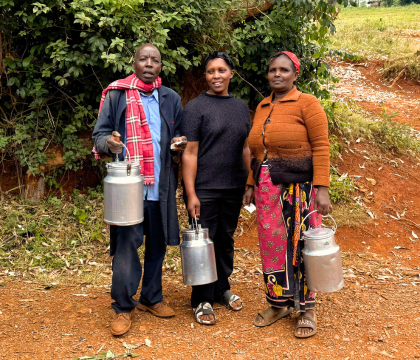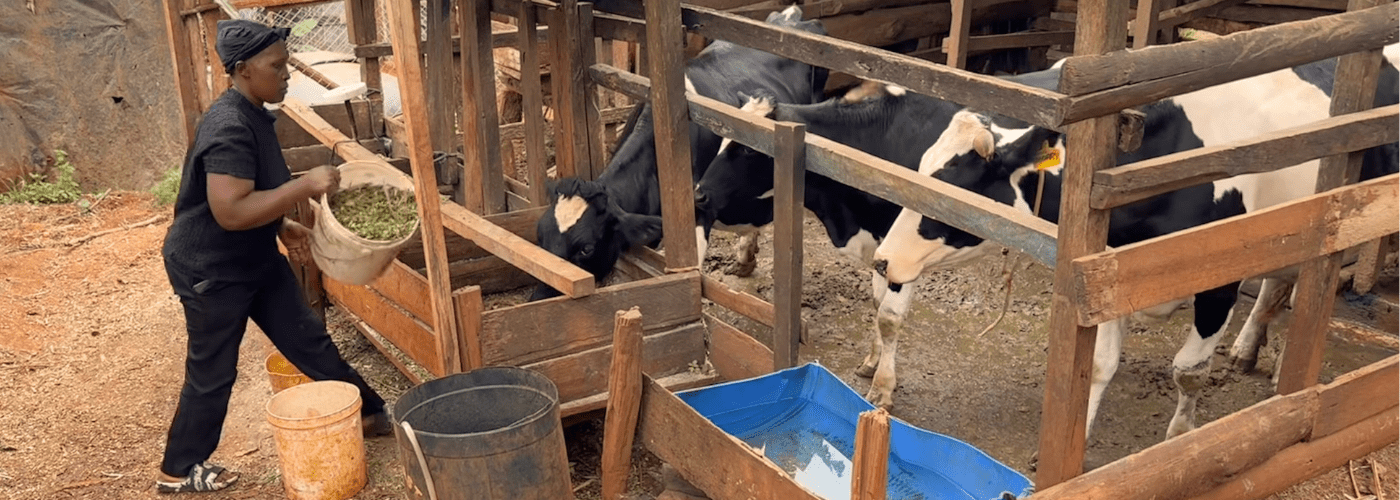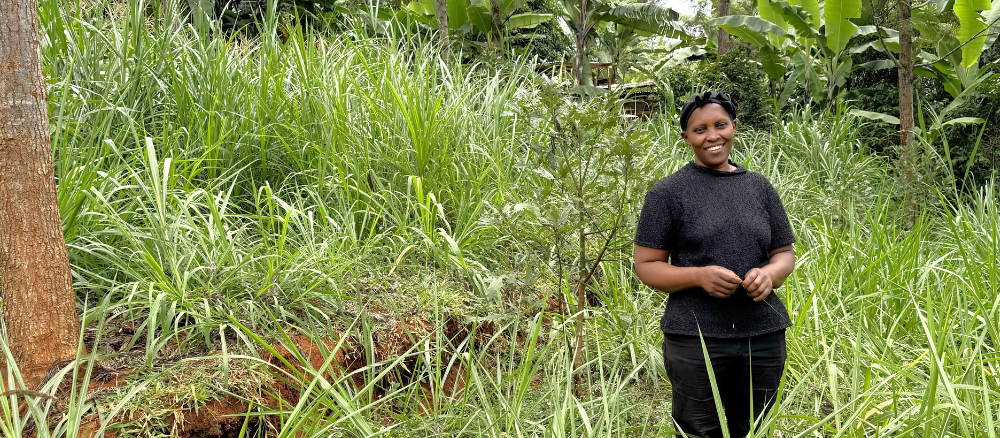This blog was written by Tanja Kisslinger, Director of Communications at VWB, in reflection of a trip taken to Kenya in July 2024 to document our Volunteers Engaged in Gender-Responsive Technical Solutions (VETS) program.
In the heart of Thunguri Village in Kenya’s Nyeri County, the hum of daily life begins early for Mercy Wanjiku Mwangi. Before dawn, Mercy is already tending to her cows, ensuring they are fed, comfortable, and ready for the day ahead. Together with her husband, she runs a modest but thriving dairy farm that has become a symbol of resilience and progress for her community. Mercy is not just a farmer; she is a Community One Health Champion (COHC), a leader, and a source of inspiration for rural farmers striving to improve their livelihoods.
From Farmer to Leader
Mercy’s journey as a COHC began in 2021 when she was trained through VWB’s VETS program, in partnership with Wakulima Dairy. This training equipped her with skills in dairy cow management, calf rearing, fodder conservation, manure management, and even biogas utilization. Her journey from a small-scale farmer to a respected community leader is a testament to her dedication and perseverance.
“As a COHC, I’ve gained knowledge in calf rearing, cow comfort, and dairy cow management that has increased my milk production from less than 10 liters to 30 liters per cow per day,” Mercy shares. “This knowledge has also empowered me to help my community improve their farming practices.”
 PHOTO: Mercy waits for milk collection with local farmers.
PHOTO: Mercy waits for milk collection with local farmers.
 PHOTO: Mercy milks one of her three cows.
PHOTO: Mercy milks one of her three cows.
 PHOTO: Mercy counsels a neighbor at his farm.
PHOTO: Mercy counsels a neighbor at his farm.
The Role of a COHC
COHCs like Mercy play a vital role in bridging knowledge gaps between agricultural experts and rural farmers. Mercy’s leadership extends beyond her own farm; she manages five farmer groups, providing monthly training sessions on topics such as calf rearing and forage production. Following these group meetings, she visits each farmer individually, tailoring her advice to their specific needs and challenges.
One of Mercy’s most rewarding moments came from helping a neighbor rethink his approach to dairy farming. “He had too many cows to manage effectively,” Mercy recalls. “I advised him to focus on quality over quantity. He reduced his herd, improved cow comfort with cleaner bedding, and started making silage. Now, his milk production has increased despite having fewer cows.”
Rebecca Ndembo, an Extension Officer with Wakulima Dairy, praises Mercy’s efforts. “Mercy is a One Health champion and also a gender champion in her community. She and her husband work together so well, sharing workloads and supporting each other. Their partnership sets a powerful example of gender equality in farming.”
A Model for Gender Equality
Mercy’s household is a testament to the power of collaboration and mutual support. Her husband shares farm responsibilities, enabling Mercy to balance her roles as a farmer, a mother of four boys, and a community leader. This equitable partnership has not only strengthened their own productivity but also serves as an inspiring model for other families.
 PHOTO: Mercy tends to her three cows, demonstrating the hands-on expertise that has transformed her farm and inspired her community.
PHOTO: Mercy tends to her three cows, demonstrating the hands-on expertise that has transformed her farm and inspired her community.
Embracing Innovation
Mercy’s impact extends into the digital realm through her involvement with “DigiCow,” a county government initiative that helps farmers maintain digital records of their cows. From breeding schedules to health records, this technology empowers farmers to manage their herds more efficiently. As a facilitator for the program, Mercy teaches farmers how to leverage these digital tools, ensuring that traditional farming meets modern innovation.
Transforming Livelihoods
The ripple effect of Mercy’s work is evident in her community. Farmers who adopt her advice report improved productivity, healthier livestock, and increased income. These changes contribute to broader community development, enhancing food security and economic stability in the region.
 PHOTO: Mercy and neighboring farmers deliver fresh milk to the Wakulima Dairy truck several times each day. This daily collection ensures their milk is weighed, measured and transported for processing - a key step in connecting local farmers to reliable income opportunities.
PHOTO: Mercy and neighboring farmers deliver fresh milk to the Wakulima Dairy truck several times each day. This daily collection ensures their milk is weighed, measured and transported for processing - a key step in connecting local farmers to reliable income opportunities.
“The community has embraced the new knowledge and trainings I bring, leading to better productivity and improved livelihoods for many farmers here,” Mercy reflects. “It’s a good feeling to see others succeed through the guidance and support I provide.”
Sustaining Success
Mercy’s dedication to continuous learning ensures she remains a reliable resource for her community. Through quarterly refresher workshops and training delivered by Wakulima Dairy and VETS volunteers, she updates her knowledge on topics like protein-rich forage and heifer management. In addition to group training sessions, VETS volunteers conduct farm visits to provide one-to-one counseling. These combined efforts not only enhance Mercy’s skills but also reinforce her confidence as a leader.
Looking ahead, Mercy dreams of expanding her farm to include poultry and pig farming. She envisions a future where her dairy farm’s success serves as a foundation for further diversification, providing even greater stability for her family and community.
A Message for Aspiring Leaders
Mercy’s advice for women considering leadership roles is simple yet profound: “Be committed. Be an example with your own farm. Love what you do. Together, we can achieve great things.” Her journey from a farmer to a Community One Health Champion illustrates the transformative power of knowledge, collaboration, and determination. Mercy’s story is a testament to the invaluable role of COHCs in fostering sustainable livelihoods and empowering rural communities in Kenya.
 PHOTO: Mercy stands proudly in her lush field of forage, a testament to the sustainable farming practices she champions across Nyeri County.
PHOTO: Mercy stands proudly in her lush field of forage, a testament to the sustainable farming practices she champions across Nyeri County.
The Bigger Picture
Mercy’s work highlights the interconnected challenges and opportunities in rural dairy farming. By improving milk production and livestock health, COHCs like Mercy contribute to food security and economic growth. Their leadership exemplifies the “One Health” approach, recognizing the interdependence of animal health, human well-being, and environmental sustainability.
In rural Kenya, where women often bear the dual burdens of farming and household responsibilities, Mercy’s story underscores the importance of empowering women as agents of change. Her achievements serve as a powerful reminder that when women thrive, entire communities flourish.
Through the VETS program, VWB continues to support champions like Mercy, ensuring that knowledge, innovation, and collaboration remain at the forefront of sustainable development. Mercy’s story is not just about dairy farming; it is about resilience, hope, and the boundless potential of communities working together to create a better future.
VETS is an 8-year initiative (2020-2028) to improve the economic and social well-being of marginalized people, particularly women and girls, in 6 countries across Africa and Asia. In collaboration with local partners, the program is implemented through 190 Canadian volunteers on international assignment and is generously funded by Global Affairs Canada. Learn more.





